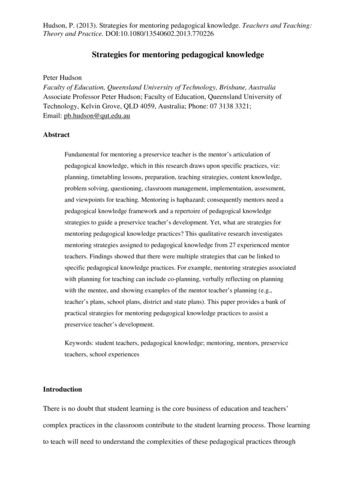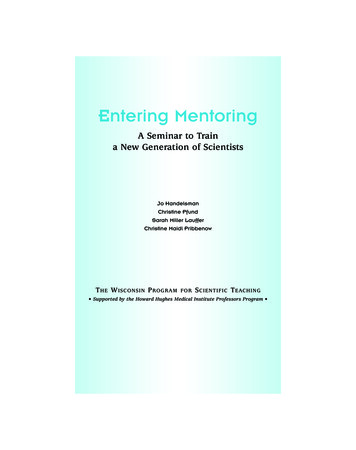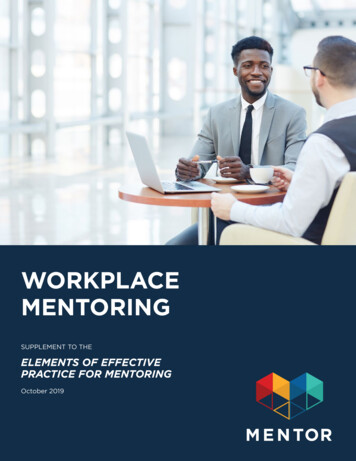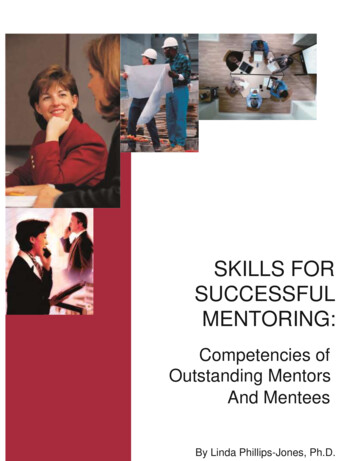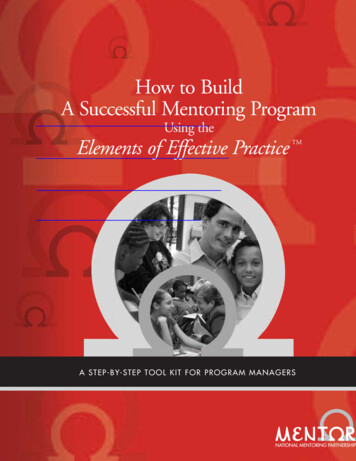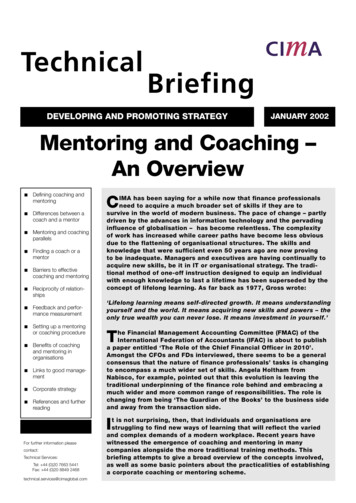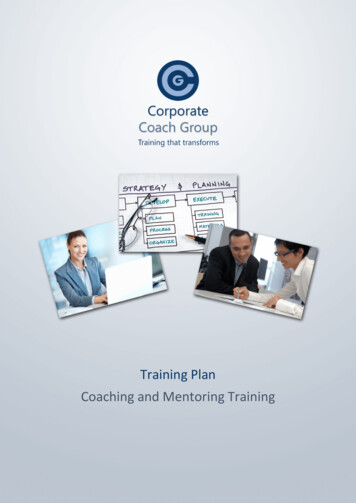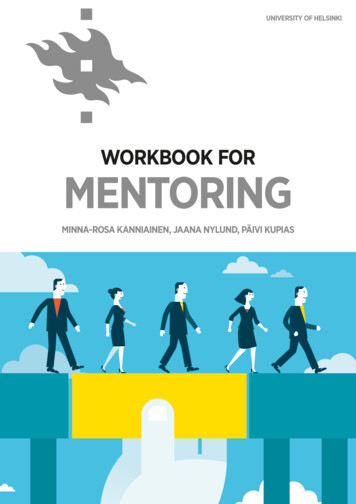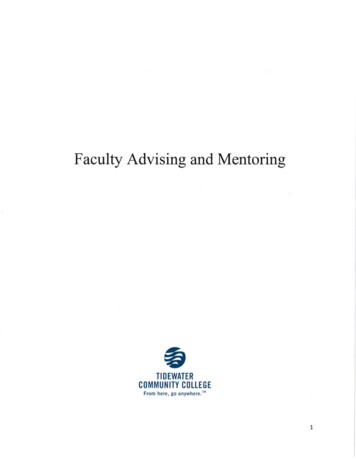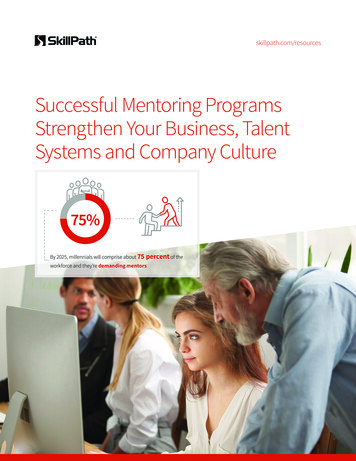
Transcription
skillpath.com/resourcesSuccessful Mentoring ProgramsStrengthen Your Business, TalentSystems and Company CultureBy 2025, millennials will comprise about 75 percent of theworkforce and they’re demanding mentors
The most successful companies have discoveredthe best strategy for business is aligning theirtalent systems to operational needs. Theseforward-thinking companies develop theirbusiness strategies with people in mind,understanding that their competitivenessand performance depends on the success oftheir employees. A key component to thissuccess is establishing a sound and effectiveThe Benefits of Effective MentoringToday, we’re seeing more organizations creatementoring programs that contribute to thecompany’s health. Effective mentoring—both formaland informal—increases morale and productivityand aids career development.However, successful mentoring programs don’thappen by accident. They begin with a strongmentoring system.business case to clearly demonstrate why theWhy Mentoring Is Necessary to AttractToday’s TalentLuckily, there are more studies done every day thatEvery day, 10,000 baby boomers reach the age ofbuilding a strong program.65 and this trend will continue until 2029. This iscausing a huge business leadership and talent gapthat must be addressed. By 2025, millennials willcomprise about 75 percent of the workforce, andthey’re demanding mentors. Once considered “niceto have,” effective mentorships are now must-haveprograms for business. Millennials—and the GenZ workers coming up behind them—want to workcompany should devote significant resources.provides the data you need to state your case forReasons for establishing a mentoring program mustbe linked to the organization’s business goals. Forexample, a company forecasting tremendous growthin a specific job area needs to prepare employeeswith high potential, whether it is in management orsignificant field work. Mentoring greatly streamlinesthe continuity of company performance.in a self-aware and engaged company culture thatListed below are some reasons why companiesvalues the whole person, as well as the community,choose to establish mentoring programs:and not just the production of the individual. Forbusinesses, creating and maintaining productive and Mentoring helps new recruits, trainees orvibrant work environments is critical to attractinggraduates settle into the organization and “hitand keeping the best employees. Without mentoringprograms, this environment cannot be created foryounger generations of workers.Millennials value mentoring opportunities andconsider this as a selling point for advancing theircareers. They want constant feedback and are ina hurry to be successful, so formal developmentprograms like mentoring are important.02Successful Mentoring ProgramsAs part of the onboarding process—the ground running” Skills enhancement—Mentoring enablesexperienced and highly knowledgeable staff topass their expertise on to others who need toacquire specified skills
Professional identity—When younger employees are starting their careers, theyencouraging environment through ongoingoften want to learn what it means to be ainteractions, coaching, teaching and role“professional” and how a true professionalmodeling that facilitates progression withinembodies the best values of his or herthe organization. Mentoring affects employeeoccupation. Mentors can play a critical role inretention because it helps establish anteaching younger employees how to establishorganizational culture that is attractive to thetheir professional identity.top talent clamoring for growth opportunities.Mentoring is a tangible way to show employeesCareer development—Mentoring helpsthey are valued, and the company’s futureemployees plan, develop and manage theircareers. It makes them tougher during timesof change and allows them to have moreincludes them. Recruitment—Mentoring enhances talentcontrol of their careers. Having a good mentoracquisition and recruitment goals by offeringaccentuates the desire to become a more self-additional incentives to prospective employeesdirected learner. Staff retention—Mentoring provides an Knowledge management/knowledgeLeadership and managementtransfer—Mentoring provides for thedevelopment—Mentoring encourages theinterchange/exchange of informationdevelopment of leadership competencies.knowledge between members ofThese competencies are often more easilydifferent organizationsgained through example, guided practice orexperience than by education and training.Mentors can play acritical rolein teaching youngeremployees howto establish theirprofessional identity.Successful Mentoring Programs03
The Talent System—Mentoring ProgramsCompanies that optimize and create a talent system see mentoring programs as a vital cog. But where does it fit in? A simplestrategy is to include mentoring programs into your talent system after succession planning, allowing outgoing leaders to flowinformation into the mentoring program.How Mentoring Fits Into YourBusiness StrategyWhat Makes a Good Mentoring Program?A mentoring program is effective when it keepsyour unique situation, there are certain elements thatemployees engaged, productive and loyal to thecompany. It also streamlines talent acquisitionto keep top talent coming in, and it ensures theemployee pipeline remains full and leadershipsuccession is strong. In turn, the health of theorganization flourishes.If you have a great approach to mentoring as anorganization, you’ll find it becomes a key lever ofmaking your talent system work better. For example,mentoring becomes an important element inattracting talent and the whole recruiting cycle. Italso can be a key point of looking at development ofhigh potentials.04Successful Mentoring ProgramsWhile your mentoring program style depends onexist in every successful mentoring program. Here isa list of the most important elements and actions.1. Create clear business objectives and getthe support of leadershipYou might be surprised at the number ofmentoring programs that exist that don’thave clear objectives or strong buy-in frommanagement. These programs are doomed tostruggle and eventually fail because no one canarticulate what success looks like.
2. Determine what a successful mentor/5. Monitor and managementee relationship looks likeHow will you know if your mentoring programYou can’t just pull names out of a hat andis a success? You won’t until you start trackingexpect it to work. Putting in the work atprogress. Identify participants who have notthe beginning to pre-select partnershipsyet communicated or are lacking engagementsaves time, money and potential frustrationand find out why. If you are using mentoringand stress. Consider giving mentees a saysoftware, leverage pulse surveys andin their development by allowing them toprogram reports to receive goal-setting andpick a particular mentor or listing their topsatisfaction updates.three candidates.3. Build in flexibility6. Life happensIf the situation of a mentor or mentee changesEffective mentoring programs balance the(available time, personal issues, etc.), feel freeparadoxical needs of structure and flexibility.to remove that person from the program andThere needs to be a level of formality, evenmatch the other person with another partner.in your informal programs, because you stillneed to train participants, track progress andcommunicate. However, mentoring is aboutindividual growth, and participant needs areimportant. Encourage mentees to be proactiveabout what they need to grow their strengthsand abilities; they have the most to gain fromthe experience.4. Get employees excited7. Identify mile markers and closure pointsSet several points during the process to stopand assess where the mentoring relationshipstands, as well as a time when the assessmentends. Without a concrete end point, the mentoror mentee association can start to wanderaimlessly. Having said that, many iconicbusiness professionals maintain a relationshipwith their mentors outside the structuredEnsure everyone in your company knows thatcompany program and openly discuss whatyou have a mentorship program by kicking itthat relationship means to them.off with a launch event, lunch or other activity.Take the opportunity to explain the nuts andbolts of mentoring—both for getting futurementors and mentees—and emphasize howit benefits them and the company. Employeeswho feel ownership in their work want theircompanies to succeed.8. Celebrate successYou owe it to yourself to continuallydemonstrate the value of your mentorshipprogram by recognizing participants’contributions and spotlighting their triumphs.Update your corporate Web site and socialmedia with highlights of effective mentor/mentee partnerships. This brings extrapride and energy to your program, expandsparticipation and increases overall supportfrom management.Successful Mentoring Programs05
How to Measure the Success of YourMentoring ProgramMentoring programs require planning andpreparation on the part of mentors and mentees.The best mentoring programs have a strongbalance between: A carefully planned and managed setof objectives, expectations, activitiesand milestones The right environment for the relationshipartwork, insights and development “magic” thatcan happen in a great mentoring relationshipHow do you know if your mentoring programis successful? Here are some ideas formeasuring results.Before and After MetricsTo determine the general quality of your mentoringprogram, establish metrics within the organizationthat you can test before and after the program kicksoff. Metrics can be measured through: Employee survey questions, such as theorganization’s commitment and success withemployee development, coaching, employeeengagement, leadership and culture The retention of high potential employeesAnnual 360-degree surveys on programparticipants’ performance, leadershipand teamwork06Successful Mentoring ProgramsThe right environment for therelationship artwork, insights anddevelopment “magic” that can happenin a great mentoring relationship
Pre-program survey questionsBefore the mentoring program begins, document the motivation and expectations of each participant to identifykey understandings. What would like you like to get out of this program?What types of recognition are important to each of you and from whom?What benefits or returns are you each anticipating from this relationship?What roles and responsibilities will each participant have?What do you think a mentor/mentee should do?How much time, effort and enthusiasm can you devote to this relationship?What do you expect in terms of confidentiality?Post-program survey questions Did you get satisfaction from the program?Did you receive the types of recognition that you find important?Did your mentoring experience assist with or address your professional goals?Were your strengths used to help drive the mentoring experience?Were your development needs accounted for in the mentoring experience?Were your abilities enhanced? How?Were the mutually agreed-to expectations met?Did you accomplish what you set out to do?Successful Mentoring Programs07
Improve Your Mentoring, ImproveYour CultureIt’s no surprise that organizations with effectivementoring programs see positive benefits on theircompany culture. The effect mentorship has on theworkforce ultimately speaks to who the company is,how it does business and what the culture is about.It is a powerful connection that management cannotFor more information about thesuccessful mentoring programs,download our FREE white paper,Establish a Workplace MentoringProgram That Pays Off atskillpath.com/resourcesafford to ignore.About the AuthorDave Fogleman, SPHR, is the Chief Learning Officer for SkillPath, leading and providingthe vision for the instructional design department. Dave is a chief learning officer known forleading award-winning, best-in-class learning and development programs and functionsthat nurture top talent and maximize organizational effectiveness and performance. He isa collaborative, engaging leader who creates positive working environments where highperformers continually innovate and thrive.Prior to joining SkillPath, Dave had a 25-year career at Sprint, where he created dramaticimprovements in performance, improved sales and employee satisfaction, and reducedemployee attrition. He also led the award-winning Sprint corporate university thathas received national recognition from the Association of Talent Development, theInternational Society for Performance Improvement, Training magazine, the MasieLearning Institute and the Conference Executive Board.08Successful Mentoring Programs
Successful Mentoring Programs The most successful companies have discovered the best strategy for business is aligning their talent systems to operational needs. These forward-thinking companies develop their business strategies with people in mind, understanding that their competitiveness and performance depends on the success of their employees.

